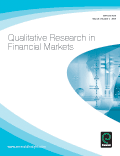
Qualitative Research in financial Markets
Scope & Guideline
Navigating the Nuances of Financial Markets
Introduction
Aims and Scopes
- Qualitative Research Methodologies:
The journal emphasizes qualitative research approaches, including phenomenological studies, case studies, and narrative analysis, to explore the intricacies of financial markets and behaviors. - Islamic Finance and Compliance:
There is a consistent focus on Islamic finance, examining Shariah compliance, the role of Islamic principles in financial practices, and the socio-economic impact of these financial systems. - Financial Inclusion and Accessibility:
Research addressing barriers and facilitators to financial inclusion, particularly in emerging markets, with a focus on women-owned businesses and marginalized communities. - Behavioral Finance:
The journal explores how psychological factors and biases affect investment decisions and financial behaviors, providing insights into investor sentiment and decision-making processes. - Sustainability and Ethical Finance:
A growing emphasis on sustainable finance practices, including green finance, ethical investments, and the role of financial markets in achieving Sustainable Development Goals (SDGs). - Digital Transformation in Finance:
Investigations into the impact of digital technologies, including FinTech and blockchain, on traditional financial practices and market dynamics.
Trending and Emerging
- Impact of COVID-19 on Financial Behavior:
There is an increasing focus on how the COVID-19 pandemic has influenced financial behaviors, risk tolerance, and decision-making processes among various demographics. - FinTech Innovations and Their Implications:
Research exploring the intersection of financial services and technology, particularly the role of FinTech in enhancing financial accessibility and efficiency, is on the rise. - Gender and Financial Inclusion:
Emerging themes surrounding gender dynamics in finance highlight the unique challenges and opportunities faced by women in accessing financial services and resources. - Sustainable Finance Practices:
A growing body of work is dedicated to examining sustainable finance, including the development of green bonds, ethical investment strategies, and their societal impacts. - Behavioral Insights in Investment Decisions:
There is a notable trend towards understanding the psychological and behavioral factors that influence investment decisions, including the role of heuristics and biases.
Declining or Waning
- Traditional Banking Practices:
Research focusing solely on traditional banking practices has decreased, as the field shifts towards digital banking and FinTech, highlighting the need for innovative financial solutions. - Regulatory Compliance Issues:
Although previously a focal point, studies centered on regulatory compliance in isolation are becoming less frequent, giving way to a more integrated approach that encompasses broader financial system dynamics. - Basic Economic Theories:
There is a noticeable decline in papers focusing on foundational economic theories without qualitative insights, as the journal increasingly favors research that combines qualitative methods with contemporary financial issues. - General Market Analysis:
Generalized analyses of market trends without qualitative depth are disappearing, as the journal seeks more nuanced insights that consider stakeholder perspectives and behavioral factors.
Similar Journals
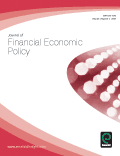
Journal of Financial Economic Policy
Bridging theory and practice in financial economic research.Journal of Financial Economic Policy is a premier academic journal published by EMERALD GROUP PUBLISHING LTD, focusing on the intersection of finance and economics. Through rigorous peer-reviewed research, the journal aims to advance understanding of financial policies and economic frameworks, addressing critical issues faced by financial markets and institutions. With an ISSN of 1757-6385 and an E-ISSN of 1757-6393, it serves as a reputable source of information for researchers, professionals, and students alike. The journal operates within the United Kingdom and is recognized for its contributions to the fields of economics and finance, achieving a Q3 category ranking in both disciplines as per the 2023 metrics. This places it within the top half of journals in its category according to Scopus ranks, demonstrating a solid impact in the academic community. Although it is not an open-access journal, the insights and analyses published are invaluable for those seeking to grasp complex financial phenomena and develop effective policies. The journal’s scope encompasses a wide range of topics relevant to contemporary finance and economic strategies, making it an essential resource for ongoing scholarly discourse and practical applications.

Review of Pacific Basin Financial Markets and Policies
Exploring Financial Frontiers in the Pacific BasinThe Review of Pacific Basin Financial Markets and Policies is a prominent academic journal dedicated to exploring the dynamic landscape of financial markets and policies within the Pacific Basin region. Published by World Scientific Publishing Co. Pte Ltd and based in Singapore, this journal serves as a vital platform for researchers, professionals, and students interested in the intricacies of finance and economics. With an ISSN of 0219-0915 and E-ISSN 1793-6705, it encompasses a broad scope addressing critical issues and emerging trends from 2003 to 2024. Despite its current positioning within the Q4 quartile for both Economics and Econometrics as well as Finance, the journal fosters invaluable contributions that encourage scholarly communication and innovation. Access to the journal is through various academic libraries and institutions, providing an essential resource for those seeking to enhance their understanding of the financial frameworks in the Pacific region.
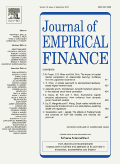
Journal of Empirical Finance
Advancing empirical insights for a dynamic financial landscape.Journal of Empirical Finance, published by Elsevier, stands as a key resource in the areas of finance and economics, with a definitive focus on empirical studies. As a prominent journal since its inception in 1993, it has made significant strides in contributing to the academic community, evidenced by its soaring categorization in Q1 for Finance and Q2 for Economics and Econometrics as of 2023. With an ISSN of 0927-5398 and an E-ISSN of 1879-1727, the journal emphasizes robust, data-driven analysis to inform both theoretical and practical aspects of financial research. While access options do not include open access, the journal ensures that its content remains accessible to a diverse audience of researchers, professionals, and students. It fosters a platform for innovative research and discourse, significantly impacting the fields of finance, economics, and econometrics. The Scopus rankings further bolster its reputation, placing it in the 61st percentile in both categories, reflecting a commitment to high-quality research output. As the journal continues to evolve, it invites contributions that push the boundaries of empirical finance, enabling a deeper understanding of financial mechanisms that drive global economies.
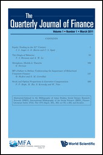
Quarterly Journal of Finance
Fostering Dialogue and Discovery in Financial ResearchThe Quarterly Journal of Finance, published by World Scientific Publishing Co. Pte Ltd, serves as a vital resource for the global academic community in the fields of Finance, Economics, and Strategy and Management. With an ISSN of 2010-1392 and E-ISSN 2010-1406, this journal boasts a respectable impact factor reflective of its standing, being ranked in the Q2 quartile across multiple categories in 2023. The journal's diverse scope includes innovative research and critical reviews that address current issues in financial practices and economic strategies, making it a pertinent platform for scholars and industry professionals alike. Despite its lack of open access, the journal's rigorous selection process ensures the publication of high-quality, impactful research. The Quarterly Journal of Finance is particularly distinguished for its commitment to advancing knowledge and fostering dialogues within its converging fields, proving to be an indispensable asset for researchers, professionals, and students eager to stay abreast of developments from 2011 to 2024 and beyond.
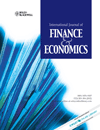
INTERNATIONAL JOURNAL OF FINANCE & ECONOMICS
Catalyzing Research in Global Financial LandscapesInternational Journal of Finance & Economics, published by Wiley, is a premier academic journal that serves as a vital resource for researchers and professionals in the fields of finance, accounting, and economics. With an impressive impact factor and a reputation for excellence, the journal is recognized in the 2023 Scopus rankings, placing in the top quartiles across multiple categories, including Q2 in Accounting, Economics, and Finance. The journal has been a significant contributor to academic discourse since its inception in 1996, with its converged years extending to 2024, thereby ensuring the continuous advancement of knowledge in these critical areas. Although it operates under a traditional subscription model, its comprehensive articles provide insightful analyses, empirical research, and theoretical advancements that cater to a diverse audience—from seasoned scholars to emerging students in the field.
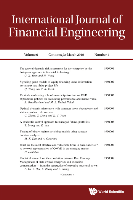
International Journal of Financial Engineering
Driving excellence in financial engineering research.The International Journal of Financial Engineering, published by WORLD SCIENTIFIC PUBL CO PTE LTD, is a premier academic journal dedicated to advancing the field of financial engineering. With a ISSN of 2424-7863 and an E-ISSN of 2424-7944, this journal offers a platform for groundbreaking research that intersects finance, mathematics, and computational techniques, promoting innovative solutions to complex financial problems. As a vital resource for researchers, practitioners, and students alike, the journal aims to disseminate cutting-edge methodologies and empirical studies that drive the financial industry forward. While the journal operates under a subscription model, its rigorous peer-review process ensures that only high-quality research is published, maintaining its significance within the academic community. With an ever-growing focus on quantitative finance and derivative pricing, the International Journal of Financial Engineering is essential for those seeking to enhance their understanding of financial markets and engineering.
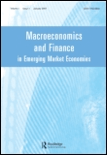
Macroeconomics and Finance in Emerging Market Economies
Illuminating Financial Pathways in Transitioning MarketsMacroeconomics and Finance in Emerging Market Economies, published by Routledge Journals, Taylor & Francis Ltd, is a vital scholarly platform dedicated to advancing the understanding and exploration of macroeconomic and financial issues pertinent to emerging market economies. With an ISSN of 1752-0843 and an E-ISSN of 1752-0851, this journal addresses the pressing challenges and dynamic transformations faced by economies in transition, making a significant contribution to the fields of economics and finance. Although currently lacking an open access option, this publication provides a rigorous peer-reviewed outlet for original research, comprehensive reviews, and theoretical advancements. With its convergence years spanning from 2010 to 2024, and retaining a respectable Q3 quartile ranking in both Economics and Econometrics as well as Finance, the journal serves as an influential resource for researchers, professionals, and students engaged in understanding the complexities of macroeconomic policies and financial practices within these rapidly developing regions. Join the discourse and enhance your understanding of current trends and future directions in macroeconomic and financial research within emerging markets.
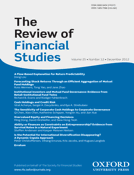
REVIEW OF FINANCIAL STUDIES
Unveiling Insights for Financial ExcellenceREVIEW OF FINANCIAL STUDIES, published by Oxford University Press Inc, stands as a premier academic journal in the realms of accounting, economics, and finance. With an impressive Impact Factor that reflects its high citation rates and broad influence, this journal, with an ISSN of 0893-9454 and E-ISSN 1465-7368, is considered a cornerstone for researchers, academics, and professionals seeking to contribute to and stay updated on groundbreaking developments in financial studies. Since its inception in 1996, it has established a robust reputation, consistently ranking in the Q1 category across multiple disciplines, highlighting its elite status in the global academic landscape. The Scopus rankings further reinforce its importance, positioning it at the forefront of business, economics, and finance research. While the journal is not open access, it offers vital insights and comprehensive studies that foster a deeper understanding of contemporary financial issues and methodologies. Located in the United Kingdom, the REVIEW OF FINANCIAL STUDIES is an essential resource for those aiming to advance their knowledge and research in this dynamic field.

Etikonomi
Empowering scholarly dialogue in economics and business.Etikonomi is a reputable academic journal dedicated to advancing the field of economics and business studies. Published by the Syarif Hidayatullah State University Jakarta, this journal has been an open-access platform since 2012, facilitating the widespread dissemination of research and ensuring that valuable economic insights are accessible to a global audience. Researchers, professionals, and students can benefit from Etikonomi's commitment to fostering scholarly dialogue and critical analysis within the ever-evolving landscape of economic theory and practice. The journal serves as a vital resource for those looking to stay abreast of the latest developments and trends in the field, making it an essential inclusion in any academic library or researcher's collection.
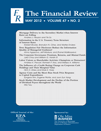
FINANCIAL REVIEW
Illuminating Contemporary Financial Issues with Scholarly RigorFINANCIAL REVIEW, a premier journal in the fields of Economics and Finance, is published by Wiley and has been contributing to the body of knowledge since its inception in 1969. With an impressive track record reflected by its Q1 ratings in both Economics and Econometrics as well as Finance, this journal stands out as a crucial resource for researchers, professionals, and students alike. The journal hosts a diverse array of scholarly articles that not only address contemporary financial issues but also provide innovative insights into economic theories and practices. Although it does not offer open access, its high impact factor and strong Scopus rankings—ranking #275 out of 716 in Economics and Econometrics and #125 out of 317 in Finance—underscore its significance in advancing academic discourse and influencing policy in the financial sector. Researchers are encouraged to explore the latest findings and methodologies shared in this esteemed journal, ensuring they remain at the forefront of their fields.